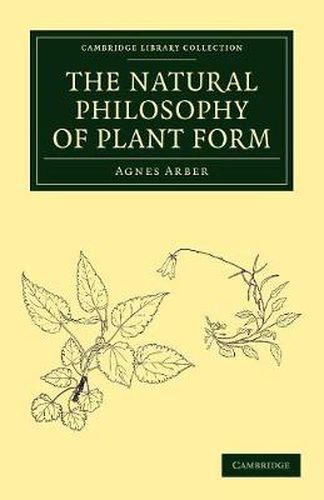Readings Newsletter
Become a Readings Member to make your shopping experience even easier.
Sign in or sign up for free!
You’re not far away from qualifying for FREE standard shipping within Australia
You’ve qualified for FREE standard shipping within Australia
The cart is loading…






When she was elected a Fellow of the Royal Society in 1946, Agnes Arber (1879-1960) was one of only three women to have been admitted into the institution. Arber conducted research that focused mainly on the morphology of flowering plants, but her work is characterised by its explorations of historical botany and evolution. First published in 1950, this book widens the scope of morphology into a study of all aspects of form across the whole chronology of botany. Arber begins with Aristotle and investigates the work of early modern botanists like Bacon and Goethe, before examining the effects of this wider approach on subjects like evolution and taxonomy. Arguing that post-Darwinian doctrine often causes botanists to twist their observations to suit a hypothetical history of phylogenesis, rather than changing the hypothesis to suit observational facts, this bold and fascinating text will interest students of biology and philosophy alike.
$9.00 standard shipping within Australia
FREE standard shipping within Australia for orders over $100.00
Express & International shipping calculated at checkout
When she was elected a Fellow of the Royal Society in 1946, Agnes Arber (1879-1960) was one of only three women to have been admitted into the institution. Arber conducted research that focused mainly on the morphology of flowering plants, but her work is characterised by its explorations of historical botany and evolution. First published in 1950, this book widens the scope of morphology into a study of all aspects of form across the whole chronology of botany. Arber begins with Aristotle and investigates the work of early modern botanists like Bacon and Goethe, before examining the effects of this wider approach on subjects like evolution and taxonomy. Arguing that post-Darwinian doctrine often causes botanists to twist their observations to suit a hypothetical history of phylogenesis, rather than changing the hypothesis to suit observational facts, this bold and fascinating text will interest students of biology and philosophy alike.